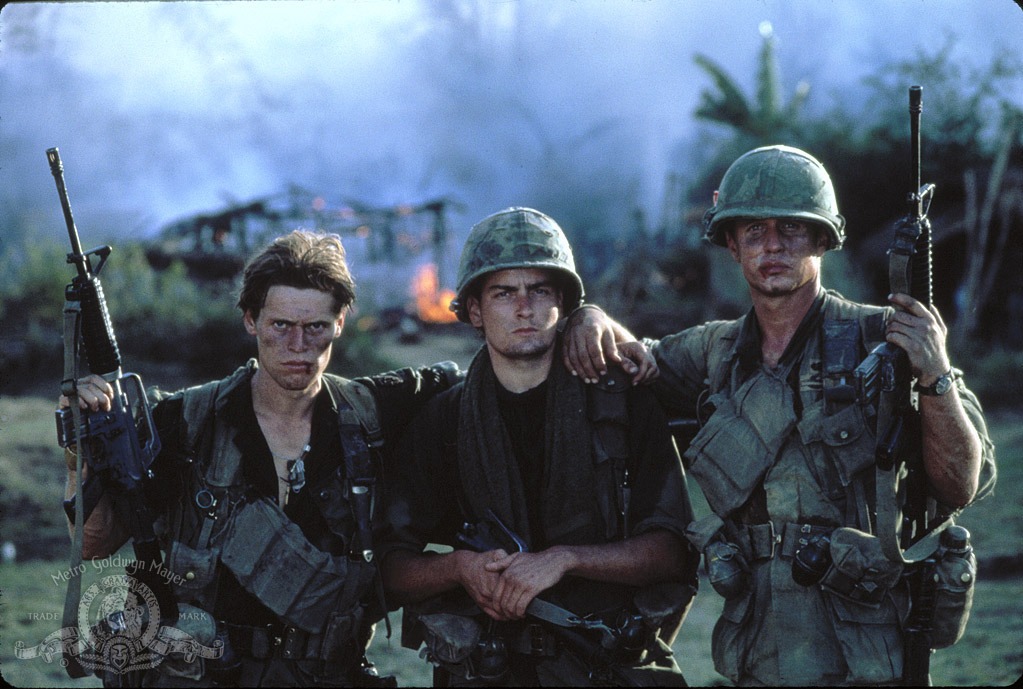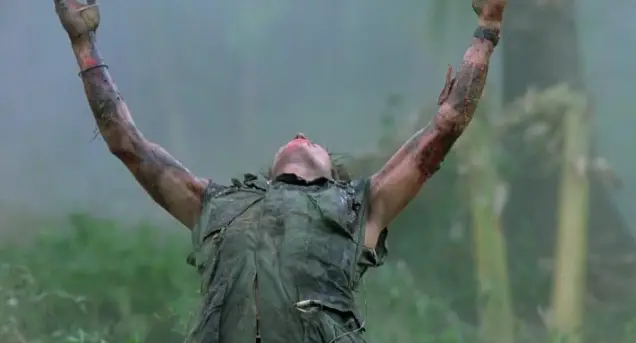Platoon (1986)

Oliver Stone’s “Platoon,” released in 1986, stands as a powerful testament to the brutality and moral complexities of the Vietnam War. Set in 1967, the film provides an unflinching portrayal of a young soldier’s descent into the heart of darkness as he navigates the psychological and moral challenges of combat.

The story unfolds through the eyes of Chris Taylor (played by Charlie Sheen), a naive and idealistic volunteer who arrives in Vietnam with romanticized notions of heroism and duty. Quickly disillusioned by the harsh realities of war, Taylor finds himself thrust into a platoon divided between two sergeants with contrasting ideologies. Sergeant Barnes (played by Tom Berenger) embodies ruthless pragmatism and survival at any cost, while Sergeant Elias (played by Willem Dafoe) represents compassion and humanity amidst the chaos.
Stone, himself a Vietnam veteran, draws upon his personal experiences to craft a narrative that eschews glorification in favor of raw authenticity. Through vivid and visceral imagery, the film captures the relentless brutality of jungle warfare, where moments of intense combat are juxtaposed with periods of haunting silence. The cinematography by Robert Richardson immerses the audience in the dense foliage and oppressive humidity, evoking a sense of claustrophobia and dread that mirrors the soldiers’ experiences.

Central to the film’s impact is its exploration of moral ambiguity and the psychological toll of war. As Taylor witnesses atrocities committed by both enemy forces and fellow Americans, he grapples with questions of loyalty, justice, and the blurred lines between right and wrong. The conflict between Barnes and Elias serves as a microcosm of the larger ideological struggle within the platoon, reflecting the broader divisions within American society during the Vietnam War era.

The performances in “Platoon” are exceptional, with Charlie Sheen delivering a nuanced portrayal of a young man’s loss of innocence amidst the chaos of war. Tom Berenger’s portrayal of Sergeant Barnes is chillingly effective, capturing the character’s ruthless determination and internal turmoil. Willem Dafoe’s portrayal of Sergeant Elias provides a poignant counterbalance, portraying a soldier who maintains his humanity even in the face of despair.

Thematically, “Platoon” explores the corrosive effects of war on the human psyche, depicting how individuals are transformed by their experiences in combat. The film offers a searing critique of the dehumanizing effects of violence and the moral compromises that accompany armed conflict. Stone’s screenplay delves into complex themes of betrayal, redemption, and the search for meaning amidst chaos, resonating with audiences long after the credits roll.
“Platoon” received critical acclaim upon its release, winning four Academy Awards including Best Picture and Best Director for Oliver Stone. Its impact extends beyond its cinematic achievements, sparking conversations about the Vietnam War’s legacy and the ethical challenges faced by soldiers in any conflict.

In conclusion, “Platoon” remains a seminal work in the war film genre, celebrated for its uncompromising realism, powerful performances, and provocative exploration of war’s human toll. By confronting audiences with uncomfortable truths about warfare and morality, Oliver Stone’s masterpiece continues to resonate as a testament to the enduring impact of war on the human spirit.











